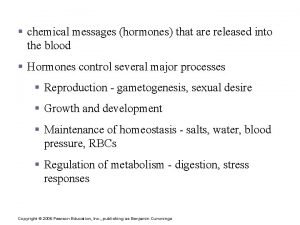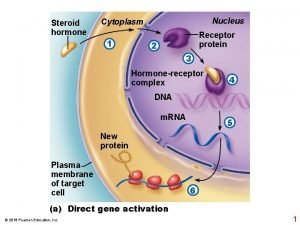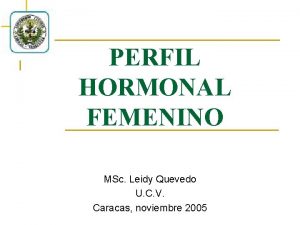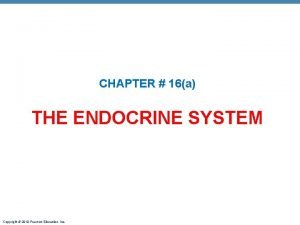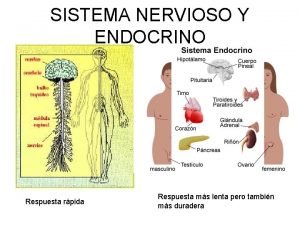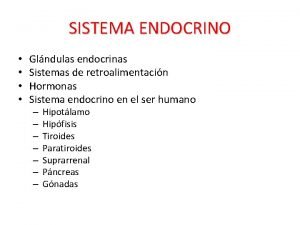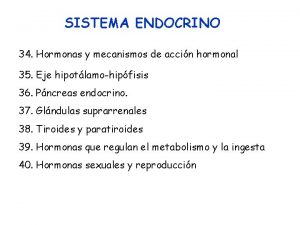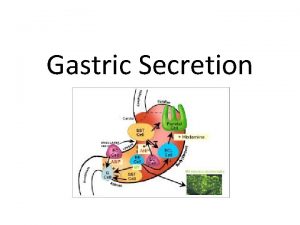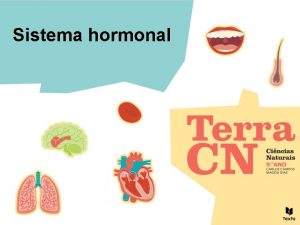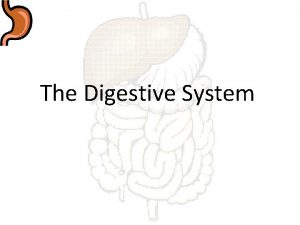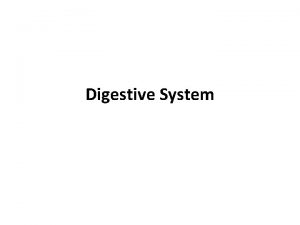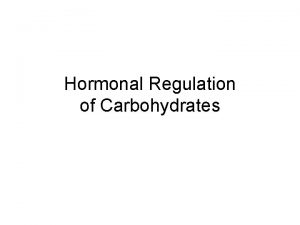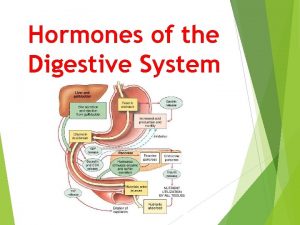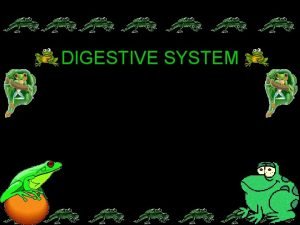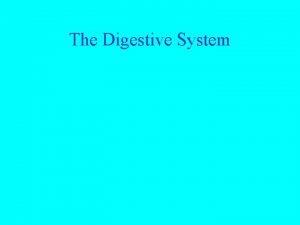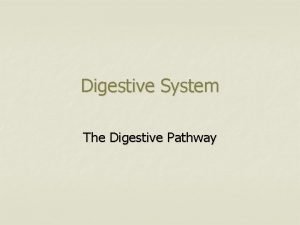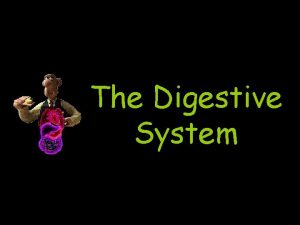Hormonal control in the Digestive system Gastric hormones















- Slides: 15

Hormonal control in the Digestive system: Gastric hormones GASTRIN: Secretion: By enteroendocrine (G) cells in gastric pits of the mucosa. Stimulus: Stomach distention and acid p. H of chyme causes Gastrin. Action: – – – 1. increases HCl production in stomach 2. increases gastric motility 3. stimulates growth of gastric mucosa 4. contract lower esophageal sphincter 5. relaxes pyloric sphincter 6. relaxes ileocecal sphincter

Hormonal control in the Digestive system: Gastric hormones Somatostatin: Secretion: By enteroendocrine (D) cells in gastric pits of the mucosa in the pylorus. Stimulus: continuously released, overridden by Gastrin and nerves Action: – Inhibition of Gastrin production

Hormonal control in the Digestive system: Small Intestinal hormones SECRETIN: Secretion: By Enteroendocrine (S) cells in the Crypts of Lieberkuhn of small intestine. Stimulus: Acid chyme in small intestine causes secretion of Secretin: Actions: – stimulate secretion of pancreatic juice and bile that is rich in bicarbonate ions. – inhibit production of HCl in stomach – promote growth and maintenance of the pancreas – enhance effects of Cholecystokinin (CCK) – Increases rate of bile secretion by hepatocytes

Hormonal control in the Digestive system: small intestinal hormones CHOLECYSTOKININ (CCK): Secretion: Enteroendocrine (CCK) cells in the small intestine mucosa Crypts of Lieberkuhn Stimulus: Chyme rich in amino acids, triglycerides and fatty acids enter the small intestine. Actions: – – – increases secretion of pancreatic juice rich in digestive enzymes opens the Sphincter of Oddi contracts the gallbladder Inhibits gastric secretion and motility May reduce hunger

Hormonal control in the Digestive system: small intestinal hormones Gastric Inhibitory Peptide (GIP): Secretion: Enteroendocrine cells in the small intestine mucosa Crypts of Lieberkuhn Stimulus: Chyme rich in triglycerides, fatty acids, and glucose enter the small intestine. Actions: – – Stimulates release of insulin by beta cells Inhibits gastric secretion and motility Stimulates lipogenesis by adipose tissue Stimulates glucose use by skeletal muscle cells

Hormonal control in the Digestive system: small intestinal hormones Vasoactive Intestinal Peptide (VIP): Secretion: Enteroendocrine cells in the small intestine mucosa Crypts of Lieberkuhn Stimulus: Chyme entering the small intestine. Actions: – – – Stimulates buffer secretion Inhibits gastric secretion Dilates intestinal capillaries

Hormonal control in the Digestive system Pancreas and Islets of Langerhans • Endocrine cells make up 1% of the pancreas and are observed as Islets of Langerhans: 1. Alpha Cells: Secrete Glucagon (increases blood sugar) 2. Beta Cells: Secrete Insulin (decreases blood sugar) 3. Delta Cells: Secrete Human Growth Hormone. Inhibiting Hormone (inhibit secretion of both glucagon and insulin and slows rate of nutrient absorption) 4. F-Cells: Secrete Pancreatic Polypeptide (inhibit secretion of digestive enzymes and inhibits contraction of the gallbladder)

Enzymatic Digestion of Carbohydrates Enzyme Amylase Source Salivary glands Pancreas Dextrinase Brush Border cells Maltase Brush Border cells Sucrase Brush Border cells Lactase Brush Border cells Substrate Starches Amylose Dextrins Product Maltose Dextrins Glucose Maltose Glucose Sucrose Glucose Fructose Glucose Galactose Lactose

Enzymatic Digestion of Lipids Enzyme Source Substrate Product Lipase Tongue (Lingual) Triglycerides Fatty acids monoglycerides Lipase Stomach (gastric) Milk butterfats Fatty acids monoglycerides Lipase Pancreas Triglycerides Fatty acids (pancreatic) monoglycerides

Enzymatic Digestion of Proteins Enzyme Source Substrate Product Pepsin Chief Pepsinogen Cells (HCl) Trypsin Acinar Trypsinogen Cells (enterokinase) Chymotrypsin Acinar Chymotrypsinogen Cells (Trypsin) Proteins Peptides Amino acids

Enzymatic Digestion of Proteins Enzyme Source Substrate Product Elastase Acinar Proteins Peptides amino Proelastase Cells acids (Trypsin) Carboxypeptidase Acinar Terminal AA Amino on the acids Procarboxypeptidase cells carboxyl end (Trypsin) Enterokinase Brush Trypsinogen Trypsin Border

Enzymatic Digestion of Proteins Enzyme Aminopeptidase Dipeptidase Source Substrate Product Brush Terminal AA Amino Border at the amino acids end Brush Dipeptides Amino Border Acids

Enzymatic Digestion of nucleic Acids Enzyme Source Substrate Product Ribonuclease Acinar Cells Ribonucleic acids Nucleotides Acinar Cells Deoxyribonucleic acid Nucleotides Brush Border Nucleotides Nitrogenous Bases, pentoses, phosphates Deoxyribonuclease Nucleosidases (A, G, , C, or U) (A, G, T, C)


 Respiratory system circulatory system digestive system
Respiratory system circulatory system digestive system Humoral stimulus
Humoral stimulus Hormonal stimulus
Hormonal stimulus Perfil hormonal femenino
Perfil hormonal femenino Coordenação hormonal
Coordenação hormonal Pearson
Pearson Example of hormonal stimulus
Example of hormonal stimulus Regulación de la secreción pancreática
Regulación de la secreción pancreática Introduccion aparato reproductor masculino
Introduccion aparato reproductor masculino Tono muscular
Tono muscular Neural and hormonal communication
Neural and hormonal communication The hormonal signal for the start of puberty begins in the:
The hormonal signal for the start of puberty begins in the: Hormonal
Hormonal Similitudes
Similitudes Hormonal surge meaning
Hormonal surge meaning Aerotactismo
Aerotactismo

